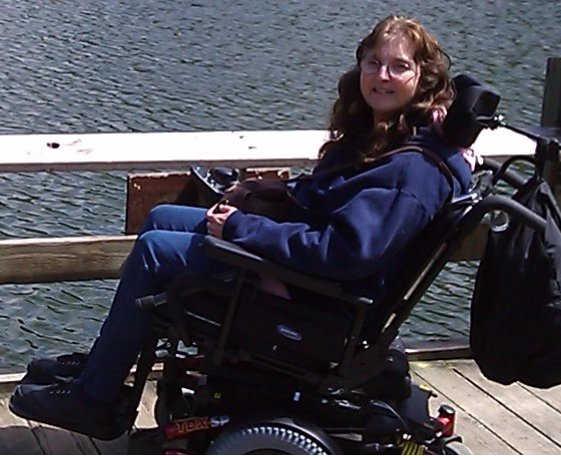Why Do I Use a Power Wheelchair When I Can Walk?
Someone asked me recently why I use a power wheelchair when I have the ability to walk. Why don’t I force myself to walk? Why have I given up?
The following was my answer:
Please do not judge me until you live a day in my life and understand the disabling medical condition I endure daily. I am able to walk a few steps with the assistance of a walker or cane, but due to a rare, invisible, chronic, hereditary, debilitating mineral metabolic disorder called periodic paralysis, my skeletal and breathing muscles are weak and progressively getting weaker, permanently.
I have developed exercise intolerance. This means I am unable to do physical exercise or exertion on a level those others my age can. This condition also causes extreme pain and fatigue after exercising or exertion and other debilitating symptoms such as a feeling of heaviness in the muscle groups.
Normally, food and oxygen are converted into energy and delivered to the muscles, but this cycle is disrupted in exercise intolerance. The muscles are unable to use the nutrients and oxygen, and therefore, not enough energy is generated to my muscles, and I am left with little or no energy.
The fatigue causes me to be off-balance and at great risk for falling. When I walk more than a few steps, I get out of breath right away, my oxygen levels drop, my blood pressure rises and my heart goes into tachycardia. If I fall, I risk breaking bones from my severe osteoporosis or risk other injuries for which there is no treatment for me because I cannot use anesthesia, antibiotics or most medications. If I use them, I risk life-threatening side effects and arrhythmia called long QT syndrome, which can kill me. I also risk going into paralysis. For me, these paralytic episodes can be full-body, lasting hours or days and are accompanied by the same dangerous heart arrhythmia; I am unable to open my eyes, speak or move in any way, and I experience heart rate fluctuation, blood pressure fluctuation, choking, breathing difficulties and low oxygen levels. Cardiac arrest and/or respiratory arrest can also accompany the episodes.
Using a power wheelchair is important in other ways — if I am weak and in and out of paralytic episodes or experiencing extreme muscle weakness. I have an easier time of getting around and my husband has an easier time helping me and moving me from place to place. He can control the chair and does not have to lift me (he is also disabled). The chair has a reclining option because even sitting up straight proves to be too much exertion, and a headrest, which keeps my head and neck straight. When in paralysis, my neck muscles go totally flaccid, and my head will fall to the side causing great pain.
I am in pain 24/7 and can take no pain medications. My power chair has specialized cushions that help relieve the pain. I must use oxygen, and I am able to attach my oxygen to my power wheelchair, which is convenient.
My power chair also gives me some independence. I have a self-propelled wheelchair, but I need someone to push me around in it because I do not have enough muscle strength in my arms to propel myself. My power wheelchair gives me the ability to go out my back door independently and go for “walk” in my forest or my neighborhood. I can shop by myself as I recline in my chair.

Scooters in markets and other places force me to sit up straight and exert more energy by keeping me extended on the controls, so they are problematic for me. My power wheelchair has a special hand control I am able to use with my arms resting.
Can I walk? Yes! Should I walk? No! Is a power wheelchair the best option for me? Yes. Do I look normal? Yes! Am I normal? No. Do I wish I could walk like everyone else? Yes. Do I wish I did not have to use a wheelchair? Absolutely. Am I giving up? No. I am trying to stay alive!
The Mighty is asking the following: Describe your experience of not quite fitting under one specific diagnosis or a label your community identifies with. If you’d like to participate, please send a blog post to community@themighty.com. Please include a photo for the piece, a photo of yourself and 1-2 sentence bio. Check out our Submit a Story page for more about our submission guidelines.
